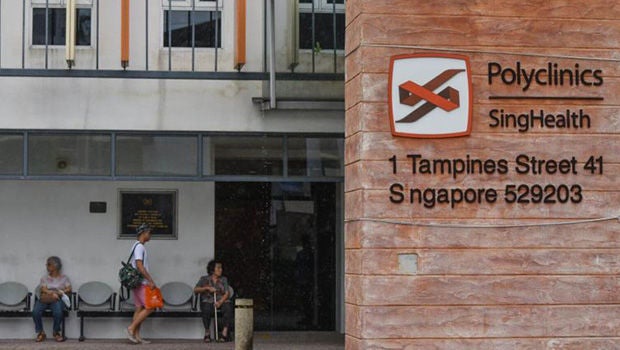
Currently, patients at SingHealth polyclinics who need further education on their conditions or who have trouble managing them are given leaflets with relevant information.PHOTO: ST FILE
Patients at SingHealth polyclinics who want to educate themselves about their health no longer need to hang on to old health information leaflets.
Instead, simply scanning a QR code found on posters in the waiting areas of polyclinics will take them to a website where e-copies of all of the healthcare provider's health education materials are available.
And starting next year, the QR codes will be printed on the walls of some SingHealth polyclinics, the provider's assistant director of nursing Tan Ai Meng said on Wednesday (Sept 25).
Currently, patients who need further education on their conditions or who have trouble managing them are given leaflets with relevant information.
Ms Tan said, however, that these tend to be misplaced or discarded, and the information on them sometimes becomes outdated. Resources also have to go into vetting and printing new materials.
SingHealth Polyclinics prints more than 46,000 such leaflets each year.
"Upgrading our health education materials...will help patients to access them any time and anywhere. It also helps to save printing cost for leaflets, reduces waste and allows our nurses to spend more time on clinical tasks," Ms Tan said.
The QR codes have been on trial since the end of last year, with polyclinic staff advising patients to scan the codes or visit the SingHealth Polyclinics website instead of handing out print materials.
From next year, Bedok Polyclinic and Punggol Polyclinic will have murals with the QR codes printed on their walls. Ms Tan said she hopes this will eventually be rolled out to all eight of SingHealth's polyclinics.
Public education campaigns will be held to teach people how to use the QR codes, and polyclinic staff are trained to help patients with this as well.
A step-by-step guide on accessing the digital materials will also be available in all SingHealth polyclinics.
Ms Tan said that the move is projected to save the group $10,000 yearly.
Recognising that some patients may not have access to smartphones, she said that print leaflets will continue to be available for patients if necessary.
She hoped, however, that the initiative would reduce the number of such leaflets that need to be distributed and make it more convenient for patients to stay informed.
"We want to empower our patients to take care of their health, so we need to give them the education and information to do this - any place, any time," she said.
The latest announcement follows several other moves by SingHealth to go digital.
In March this year, it was announced that patients at hospitals, polyclinics and some specialist centres under the group could get their prescription medication delivered to them at their homes or collection points around the island.
And earlier this month, the Government Technology Agency (GovTech) said SingHealth would replace hardcopy medical certificates (MCs) with digital MCs by 2020.
Safeguards such as hosting the MCs on a government-affiliated web domain and requiring patients to unlock their MCs with their date of birth should protect against fraud and potential privacy breaches, said GovTech.
SingHealth's group chief medical informatics officer Loo Chian Min said the initiative aims to offer convenience to patients and reduce paper use, as part of ongoing efforts to be more environmentally friendly.
To date, 7,000 digital MCs have been issued, with feedback from patients being generally positive, he added.
The National University Health System, one of the other two public healthcare clusters, said it does not issue digital MCs. It added that SingHealth's ongoing pilot would be helpful for it to assess whether it should do so.
The other public healthcare cluster, the National Healthcare Group, declined to comment on the issue.
Private healthcare providers The Straits Times approached such as Thomson Medical and Mount Alvernia Hospital also said they might explore the initiative in the future.













 Get it on Google Play
Get it on Google Play